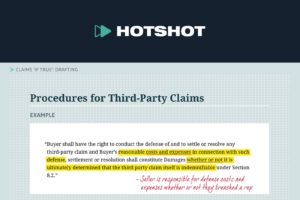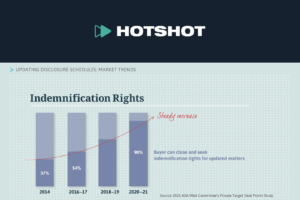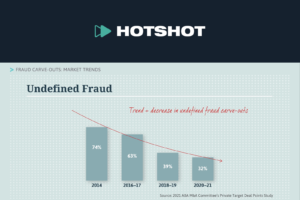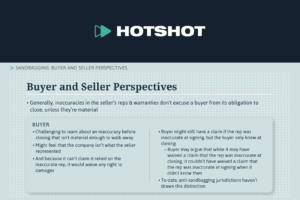This is a summary of the Hotshot course “Indemnifiable Losses,” an explanation of how loss is defined in acquisition agreements, including the types of losses typically included (and excluded) from the definition. View the course here.
Defining Loss
- In a typical private company acquisition agreement, the seller is required to indemnify the buyer for losses resulting from breaches of or inaccuracies in the representations, warranties, and covenants made by the seller.
- The scope of the seller’s indemnification obligations is often one of the most heavily negotiated elements of the acquisition agreement.
- The parties negotiate a range of issues that impact:
- Whether the seller has to pay an indemnification claim; and
- The types of costs the seller has to pay.
- The parties negotiate a range of issues that impact:
- The negotiations over the types of costs the seller has to pay center on the definition of loss.
- Nearly every private company acquisition agreement includes “Loss” or “Damages” as a defined term.
- The term is a critical component in determining the seller’s post-closing obligations.
- Buyers generally try to include a broad list of items in the definition.
- Their perspective is that they negotiated a purchase price based on a certain understanding about the business, and if there’s a claim that reduces the value of the business, they want to be compensated for that.
- Sellers want to protect the negotiated purchase price, and therefore argue for a narrow definition.
- They believe that buyers shouldn’t have any post-closing right to recapture any of the purchase price at all.
- This is consistent with the approach accepted by buyers in public-company acquisitions.
- They believe that buyers shouldn’t have any post-closing right to recapture any of the purchase price at all.
- The main types of losses that are typically included are out-of-pocket amounts the buyer or target company has to pay to a third party that are related to pre-closing obligations of the target company.
- These could be:
- Contractual obligations;
- Tort obligations; or
- Obligations owed to a governmental authority (such as the IRS).
- These could be:
- Buyers also usually try to include damages ancillary to the loss itself, including concepts like:
- The payment of costs of investigation;
- Attorneys’ fees; and
- Interest.
- In addition to these types of damages, buyers look to include matters that reduce the value of the acquired company, even if no third-party payment is made.
- This is the concept of “diminution of value.”
- Diminution of value.
- It allows buyers to seek payment over and above any actual damage or out-of-pocket expense paid by the buyer, if the loss can be related to an item that affects the value of the target company.
- When the purchase price is based on a multiple of earnings, this language may allow the buyer to make a post-closing indemnification claim based on a multiple of lost earnings. For example:
- Assume a buyer agrees on a purchase price of $100 million, which is five times the target’s earnings of $20 million for the prior year.
- The buyer discovers after closing that the earnings in the financial statements, which the seller represented and warranted were true and accurate, were in fact only $15 million, an overstatement of $5 million.
- The buyer would argue that a payment of $5 million would not make it whole because the 5x multiple it used when coming up with its valuation for the target now suggests a valuation of $75 million.
- Instead, they’d seek to recover $25 million, because the “diminution in value” of the target is five times the earnings overstatement.
- Other types of damages that frequently come up in the negotiations over the definition of loss are consequential, punitive, and incidental damages.
- Sellers will try to specifically exclude these damages from the definition on the basis that compensatory or actual damages are sufficient, and that other types of damages are too speculative and remote.
- This is often negotiated between the parties.
- In deals in which the buyer’s right to recover on a post-closing indemnification claim is limited to representation and warranty insurance, the issues around the definition of loss are largely moot.
- This is because recoverable losses will be defined by the policy.
This course also includes interviews with ABA M&A Committee members Leigh Walton from Bass, Berry & Sims and Scott Whittaker from Stone Pigman Walther Wittmann.

















